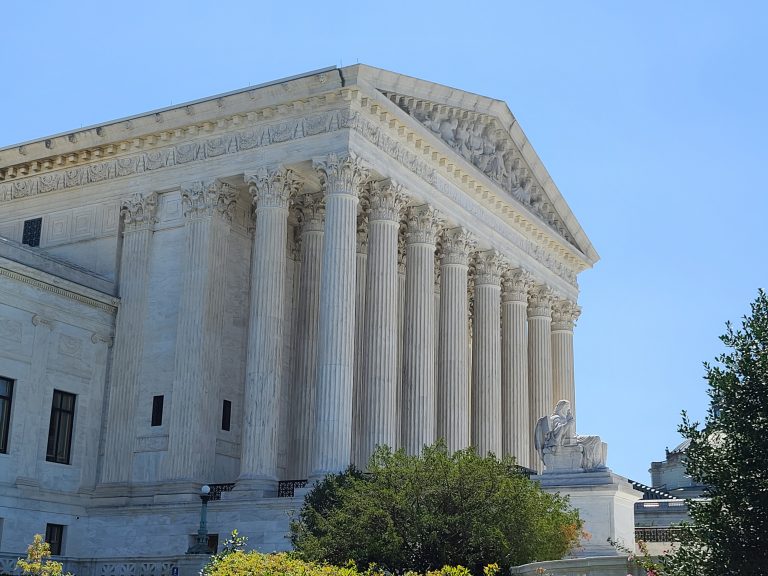The Supreme Court is taking up the bump stock ban and an NRA case, but don’t expect the outcomes to tell us much about the Second Amendment.
That’s because neither case actually involves Second Amendment questions. Garland v Cargill is primarily about the ATF’s administrative power. NRA v. Vullo is about whether a New York official violated the gun group’s speech rights.
Cargill deals with the bump stock ban first instituted by former President Donald Trump in 2018 and still defended by current President Joe Biden. A circuit split developed on the question of whether the ban is constitutional last year after the Fifth Circuit Court of Appeals bucked the other appellate courts to take up the case and struck down the ban. But they didn’t do it on Second Amendment grounds.
Instead, the majority focused on how bump stocks don’t fit the statutory definition of “machinegun,” and the ATF didn’t how the power to reclassify them as such.
“As an initial matter, it purports to allow ATF—rather than Congress—to set forth the scope of criminal prohibitions,” Judge Jennifer Walker Elrod wrote for the majority in Cargill. “Indeed, the Government would outlaw bump stocks by administrative fiat even though the very same agency routinely interpreted the ban on machineguns as not applying to the type of bump stocks at issue here. Nor can we say that the statutory definition unambiguously supports the Government’s interpretation.”
Vullo stems from a letter sent to financial institutions by former Superintendent of the New York State Department of Financial Services Maria Vullo. In it, she warned the companies they could face adverse consequences if they didn’t cut ties with the NRA.
“Subject to compliance with applicable laws, the Department encourages its chartered and licensed financial institutions to continue evaluating and managing their risks, including reputational risks, that may arise from their dealings with the NRA or similar gun promotion organizations, if any, as well as continued assessment of compliance with their own codes of social responsibility,” Vullo wrote in the letter. “The Department encourages regulated institutions to review any relationships they have with the NRA or similar gun promotion organizations, and to take prompt actions to managing these risks and promote public health and safety.”
She also praised companies that had cut ties with the NRA in the wake of the Parkland shooting.
“There is a fair amount of precedent in the business world where firms have implemented measures in areas such as the environment, healthcare, and civil rights in fulfilling their corporate social responsibility,” she said. “The recent actions of a number of financial institutions that severed their ties with the NRA and have taken other actions after the AR-15 style rifle killed 17 people in the school in Parkland, Florida, is an example of such a precedent.”
The gun-rights group filed suit against New York and Vullo claiming her pressure campaign violated its First Amendment rights.
Last year, a three-judge panel at the Second Circuit Court of Appeals ruled against the NRA. It argued that Vullo “acted reasonably and in good faith.”
“[W]e conclude that the NRA has failed to plausibly allege that Vullo ‘crossed the line ‘between attempts to convince and attempts to coerce,’” the court wrote. “Moreover, even assuming that Vullo’s actions and statements were somehow coercive, we conclude further that her conduct here–taking actions and making statements in her various capacities as regulator, enforcement official, policymaker, and representative of New York State–did not violate clearly established law.”
With the Supreme Court taking up the NRA’s appeal, we’ll soon find out if the Court thinks Vullo overstepped her power in trying to turn companies against the group based on its political beliefs. Just like we’ll soon find out if it thinks the ATF overstepped its power in reclassifying bump stocks as a means to ban them. But we won’t find out much of anything about what the Court thinks about the Second Amendment from these gun-related cases.
That doesn’t mean they won’t have a huge impact on gun owners, though.
In fact, it’s likely the bump stock case will matter more in the short term for the average gun owner than United States v. Rahimi, which is a Second Amendment case. That’s because the bump stock ban and its spiritual successors affect far more people than the domestic violence restraining orders at issue in Rahimi.
There may have only been a few hundred thousand bump stocks out there before the possession ban kicked in, but the same logic and tactics used to underride the bump stock ban have been applied to far more popular accessories too. The redefinition of “firearm” in an effort to regulate unfinished parts and homemade gun builds likely affects more. Same for the Biden Administration’s push to restrict how many used guns a person can sell without getting a license.
But the legality of Biden’s pistol-brace ban is also implicated by the outcome of the bump stock case. And that ban is easily the largest. Estimates vary widely, with the Congressional Research Service putting the number of braced guns at 40 million, but there are at least 3 million on the lowest end of the scale.
Of course, that’s not to say the Court’s decision in Rahimi won’t have major implications. It is guaranteed to provide us with at least some direct commentary on Second Amendment protections. It will provide the first insight into who can be restricted from owning firearms since the Court handed down its landmark decision in 2022’s New York State Rifle and Pistol Association v. Bruen.
Don’t expect the Court’s two new gun cases to do that. But do expect them to have a real-world impact on gun owners.






